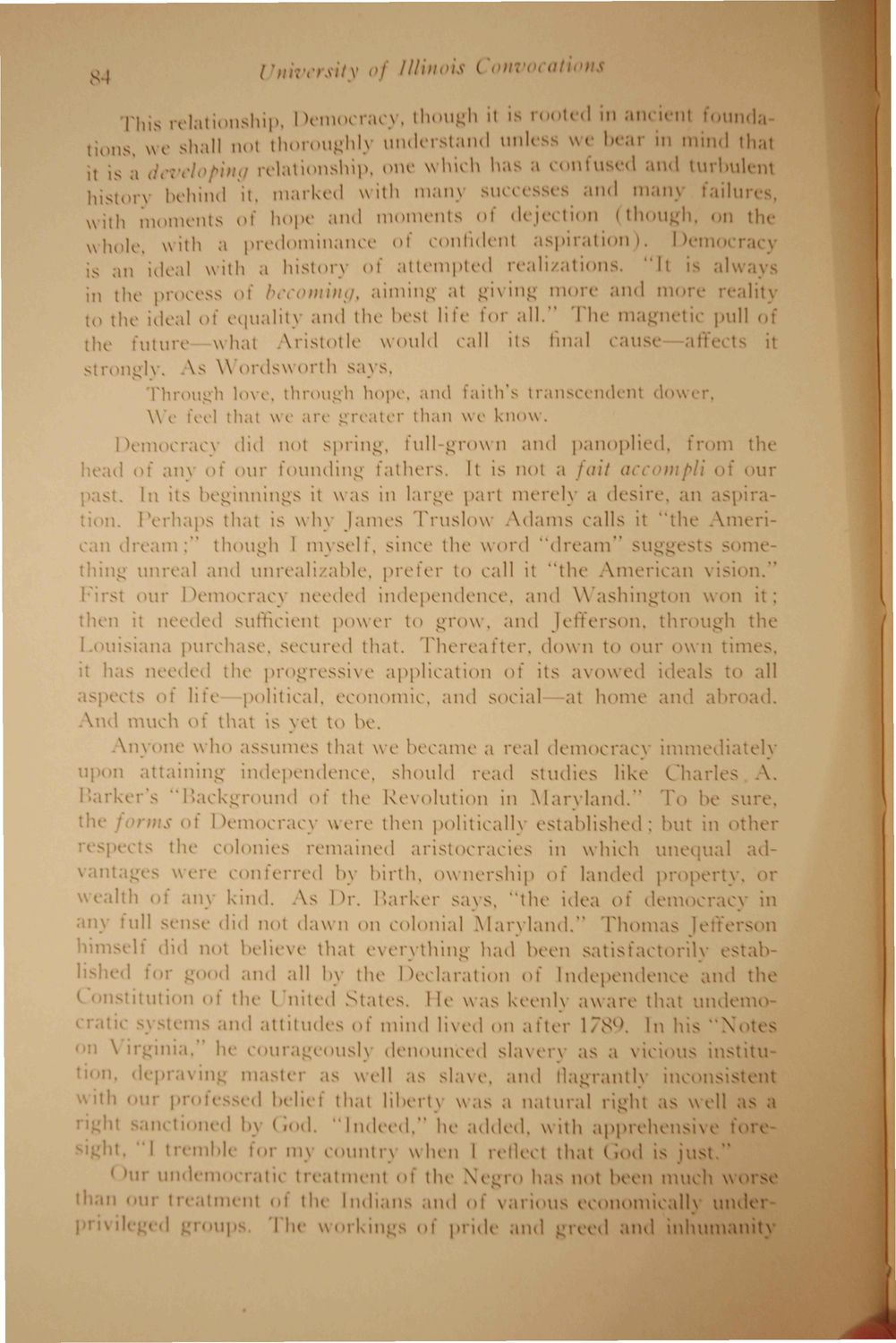| |
| |
Caption: Convocation - 1942 Winter-Spring
This is a reduced-resolution page image for fast online browsing.

EXTRACTED TEXT FROM PAGE:
gj r,i rity oj Illinois I at This relationship, I >emocrac). though il is n > d in an( ienl foundat < tions, we shall nol thorough!} understand unless we beai in mind thai i, i s 3 elopin relationship, one which has a confu I and turbulent histon behind it, marked with man) sua sses and man) tilun with moments of hope and moments of dejection (though, on th( whole, with a predominant of confident aspiration), Democracy is an ideal with a histor) of attempted realizations. ' It is alwaj in the process of / ming, aiming at giving mor< and more realit) to the ideal of equalit) and tin- best life foi all Hie magnetic pull i the future what Aristotle would call its final cause—aff< it sti ngly. \s \\ ordsworth sa) s, Through love, through hour, and faith's transcendent dower, We f I that we an greater than we know. Democracy did not spring, full-grown and panoplied, from tin head oi any of our founding fathers. It is not a fait < * ;;//>// of OU1 /< < past. In its beginnings it was in large part merely a desire, an aspiraon. Perhaps that is why lames Truslow Adams calls it "the American d r e a m ; " though I myself, since the word " d r e a m " suggests S me- thing unreal and unreali able, prefer to call it "the American vision." I st our Democracy needed independence, and Washington won it: then it needed sufficient power to g r o w , and Jefferson, t h r o u g h tin I ouisiana purchase, secured that. T h e r e a f t e r , d o w n to o u r own times, it has needed the progressive application of its avowed tsp< ts of life | ilitical, economic, ami social—at home \inl much ^i that is yet to be. Am ne win issumes that we became a real democracy ti] n attaining independence, should read studies like Barker's "Background of the Revolution in Maryland." th rms of Democracy were then politically established; sp< vanta urilih ideals to all and abroad immedia Charles A. To be sure. hut in other the colonies remained aristocracies in which u n e q u a l adwere c o n f e r r e d by birth, o w n e r s h i p o\ landed p r o p e r t y , < nix i-;,i.i Ac n,- o-,,-i .,,• ^....- " , i „ , :.!...» ..; i...^ ;., ' •« m 3^ iii, V I I i a . u i< i .i i i u i n K > ( > i n MI H I ii \ (.-(l ( i l l ,l l U l I / O V, in II l> . \ i »U - v n Virginia," he urag< >usly denounced slaven as a vicious institu •n. depraving master .is well as slave, and flagrantly inconsistent l 'i I" I belief that liberty was a natural right as well as hi inction I I I »d. "Indeed," he added, with apprehensive I e lit, * I tremble for m\ countn when I reHect that \^^\ is just." 1 'ur undem< rati< tn atment ^\ tin Megro has not been much worst 1 ur n itment of the Indians and i)\ various < onomicalh und< privil< I .nioup I he workinj pride and greed and inhumanity
| |